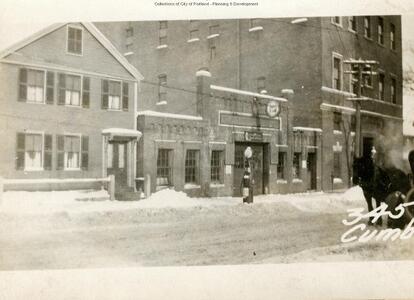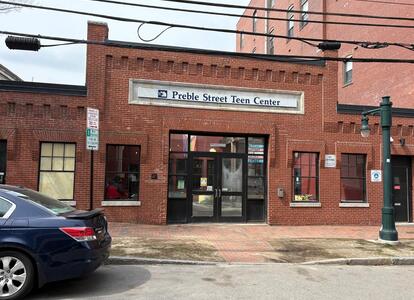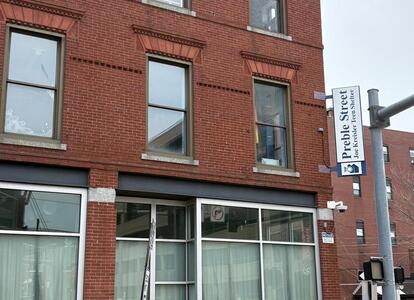Preble Street
BackPreble Street
38 Preble Street
Next door to the JCC is the Joe Kreisler Teen Shelter. Across the street on the corner with Preble St. is the Joe Kreisler Teen Center.
The organization now known as Preble Street was founded in 1975 by Joseph (“Joe”) Kreisler, a lifelong Jewish social activist from Yonkers, New York. Both the Teen Shelter and the Teen Center are named in his honor. They guarantee that a door is always kept open to homeless and runaway teens.
Preble Street just celebrated its 50th anniversary. It has become a major provider of social services to people experiencing hunger, poverty, and homelessness in Portland and beyond. Here and and other sites, Preble Street offers a range of programs, including housing and health services, street outreach, teen services, anti-trafficking services, and a huge emergency food program. The nonprofit also advocates for solutions to the challenges its clients face.
In 1972, Kreisler was hired to teach social work at the University of Southern Maine (USM). He decided to take his students out of the classroom and onto the streets, where they could get some real-world, hands-on training and help Portland’s most vulnerable residents at the same time. Kreisler was well known for not just talking about what he thought was right, but for rolling up his sleeves and making a difference. He was part of a group of social activist academics connected to the USM School of Social Work, many of whom were Jewish, that included John Romanyshyn and his wife Annie (Levy) Romanyshyn and Richard Steinman. They were considered pioneers in their field by the National Association of Social Work.
What eventually became Preble Street started out as the High Street Resource Center, a neighborhood center that helped meet the needs of low-income and homeless residents and empowered them to advocate for change. In 1981, the agency moved into the basement of the Preble Street Chapel in the Bayside neighborhood. It was renamed the Preble Street Resource Center, and started offering meals, case management, access to healthcare, job counseling, and more. Over the last half-century, Preble Street has continued to grow and evolve. Kreisler’s original vision and energy catalyzed real and enduring change in Portland and has improved the lives of tens of thousands of people.
Other Portland Jews also played a material part in building the city’s social services. One example is the Council of Jewish Women, which engaged in a variety of social service activities through the 1960s. In 1975, the council helped establish the Portland chapter of WICS (Women in Community Service), a national organization comprised of the National Councils of Jewish, Catholic and Negro Women, and the United Church Women. Through WICS, the council worked with the Women’s Job Corps and started a summer program for disadvantaged preschoolers. That program, led by its founder Rosalyne Bernstein, became the Portland public school system’s first Head Start—the federal program that promotes the school readiness of children ages birth to five from low-income families by enhancing their cognitive, social, and emotional development.


